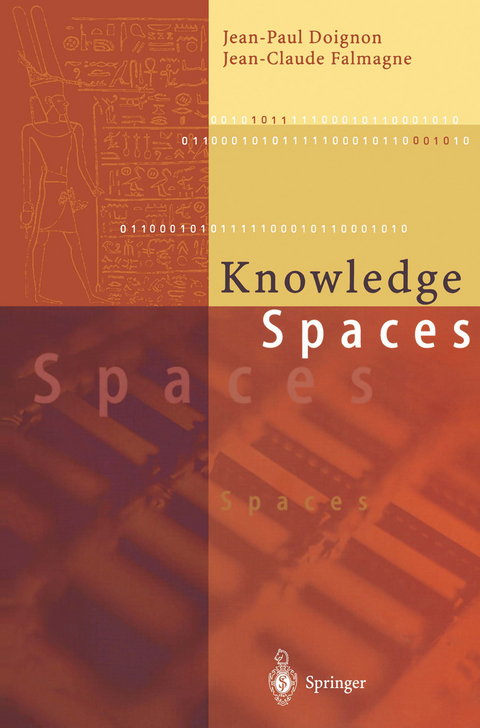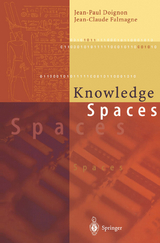Knowledge Spaces
Springer Berlin (Verlag)
978-3-540-64501-6 (ISBN)
Jean-Paul Doignon is a professor of the mathematics department of the Université Libre de Bruxelles, Belgium. His research covers various aspects of discrete mathematics (graphs, ordered sets, convex polytopes, etc.) and applications to behavioral sciences (preference modelling, choice models, knowledge assessment, etc.).
Jean-Claude Falmagne is emeritus professor of cognitive sciences at the Universtiy of California, Irvine. His research spans topics in psychophysics, probabilistic choice theory, combinatorics, measurement theory, educational technology, and philosophy of science.
0. Overview and Mathematical Glossary.- Main Concepts.- Possible Limitations.- A Practical Application: The Aleks System.- Potential Applications to Other Fields.- On the Content and Organization of this Book.- Glossary of Mathematical Concepts.- Original Sources and Related Works.- 1. Knowledge Structures and Spaces.- Fundamental Concepts.- Knowledge Spaces.- Closure Spaces.- Substructures.- Bases and Atoms.- An Algorithm for Constructing the Base.- An Algorithm for Generating a Space from its Base.- Bases and Atoms: the Infinite Case*.- The Surmise Relation.- Quasi Ordinal Spaces.- Original Sources and Related Works.- Problems.- 2. Well-Graded Knowledge Structures.- Essentially Finite Structures.- A Well-Graded Family of Relations: the Biorders*.- The Infinite Case*.- Finite Learnability.- Original Sources and Related Works.- Problems.- 3. Surmise Systems.- Basic Concepts.- Knowledge Spaces and Surmise Systems.- AND/OR Graphs.- Surmise Functions and Wellgradedness.- Hasse Systems.- Resolubility and Acyclicity.- Original Sources and Related Works.- Problems.- 4. Skill Maps, Labels and Filters.- Skills.- Skill Maps: The Disjunctive Model.- Minimal Skill Maps.- Skill Maps: The Conjunctive Model.- Skill Multimaps: The Competency Model.- Labels and Filters.- Original Sources and Related Works.- Problems.- 5. Entailments and the Maximal Mesh.- Entailments.- Entail Relations.- Meshability of Knowledge Structures.- The Maximal Mesh.- Original Sources and Related Works.- Problems.- 6. Galois Connections*.- Three Exemplary Correspondences.- Closure Operators and Galois Connections.- Lattices and Galois Connections.- Knowledge Structures and Binary Relations.- Granular Knowledge Structures and Granular Attributions.- Knowledge Structures and Associations.- Original Sources and Related Works.- Problems.- 7. Probabilistic Knowledge Structures.- Basic Concepts and Examples.- An Empirical Application.- The Likelihood Ratio Procedure.- Learning Models.- A Combinatorial Result.- Markov Chain Models.- Probabilistic Substructures.- Nomenclatures and Classifications.- Independent Substructures.- Original Sources and Related Works.- Problems.- 8. Stochastic Learning Paths.- A Knowledge Structure in Euclidean Geometry.- Basic Concepts.- Basic Results.- Assumptions on Distributions.- The Learning Latencies.- Empirical Predictions.- Limitations of this Theory.- Simplifying Assumptions.- Remarks on Application and Use of the Theory.- An Application of the Theory to the Case n =2.- Original Sources and Related Works.- Problems.- 9. Descriptive and Assessment Languages.- Languages and Decision Trees.- Terminology.- Recovering Ordinal Knowledge Structures.- Recovering Knowledge Structures.- Original Sources and Related Works.- Problems.- 10. Uncovering the State of an Individual: A Continuous Markov Procedure.- A Deterministic Algorithm.- Outline of a Markovian Stochastic Process.- Notation and Basic Concepts.- Special Cases.- General Results.- Uncovering the Latent State.- Refining the Assessment.- Proofs*.- Original Sources and Related Works.- Problems.- 11. Uncovering the State of an Individual: A Markov Chain Procedure.- Outline of a Markov Chain Procedure.- The Stochastic Assessment Process.- Combinatorial Assumptions on the Structure.- Markov Chains Terminology.- Results for the Fair Case.- Uncovering a Stochastic State: Examples.- Intractable Case.- Original Sources and Related Works.- Problems.- 12. Building the Knowledge Structure in Practice.- Koppen's Algorithm for Constructing the Knowledge Space.- Kambouri's Experiment.- Results.- Discussion of Kambouri's Results.- Cosyn and Thiéry's Work.- Refining a Knowledge Structure.- Simulation of Various Refinements.- Original Sources and Related Works.- Problems.- References.- Index of Names.- Index of Terms.
| Erscheint lt. Verlag | 20.10.1998 |
|---|---|
| Zusatzinfo | XVI, 334 p. 4 illus. |
| Verlagsort | Berlin |
| Sprache | englisch |
| Maße | 155 x 235 mm |
| Gewicht | 532 g |
| Themenwelt | Informatik ► Theorie / Studium ► Künstliche Intelligenz / Robotik |
| Mathematik / Informatik ► Mathematik ► Graphentheorie | |
| Schlagworte | algorithms • Artificial Intelligence • classification • cognitive science • combinatorics • Educational technology • Graph • Knowledge • Künstliche Intelligenz • learning • Mathematical Psychology • organization • SiM • Simulation • Text • Theory of Knowledge |
| ISBN-10 | 3-540-64501-2 / 3540645012 |
| ISBN-13 | 978-3-540-64501-6 / 9783540645016 |
| Zustand | Neuware |
| Haben Sie eine Frage zum Produkt? |
aus dem Bereich




